Share my life: two brothers from South Sudan
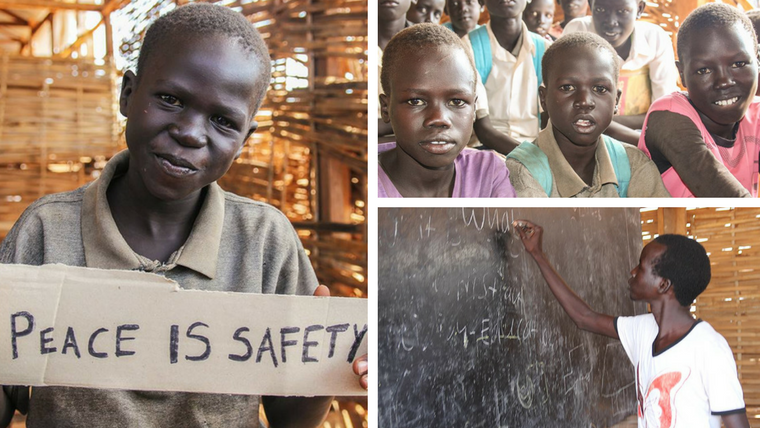
This week, as the UN discusses refugees and migrants, and President Obama hosts world leaders for a discussion on the refugee crisis, we're focusing on some of the children we work with whose lives have been completely transformed by these issues.
Recently we met with two South Sudanese brothers, ten-year-old Choul, and eight-year-old Rewgok. Having fled the Unity State, the two brothers are still waiting for their parents to join them. Here, Choul talks us through his new daily routines.
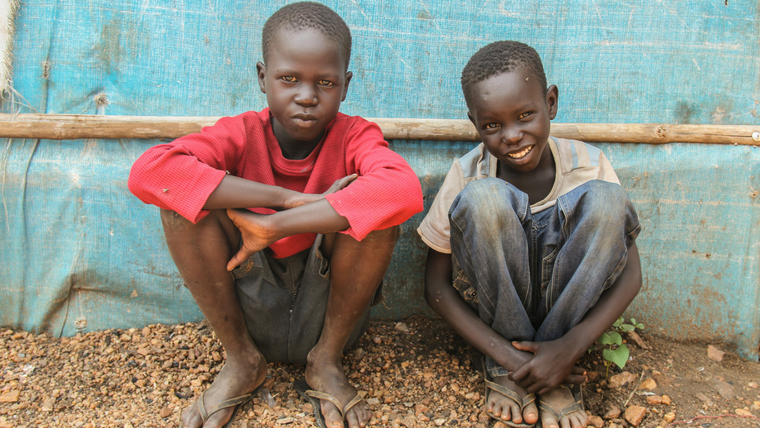
My name is Choul and I’m ten years old. This is my younger brother, Rewgok and we both live here in the PoC (protection of civilian) site. Our parents made us come here and we live with relatives, but I know that my parents are going to be here very soon too. We’re originally from Unity State, but when the conflict broke out, we had to flee.
First my parents came with us, but they later went back to make sure our house and cattle were still there. We haven’t seen them in several months now. The conflict is very sad. Our family is not together anymore and maybe we can never go home. We saw fighting in our home village and men with guns. That’s why we left. Right now, I just want my parents to come back. I haven’t spoken to them since they have left and I hope they are fine.
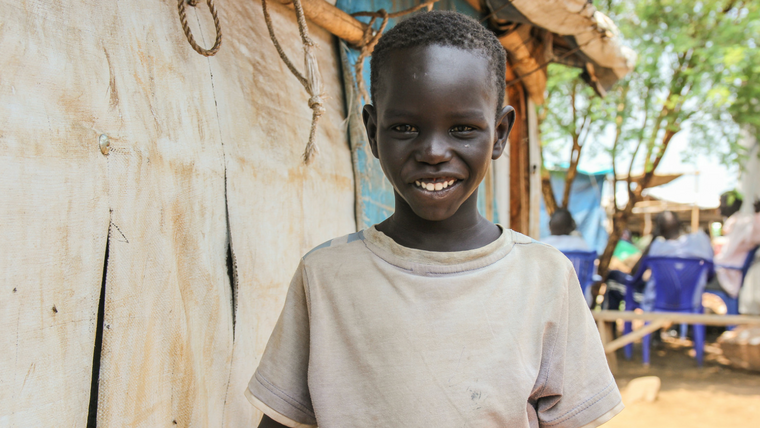
This is my brother Rewgok and he is eight years old. He just came home from school and even though he is very shy, he likes to talk about school.
Rewgok: “I like science so much and I’m in class 1. I’m happy that I can go to school here in the PoC. Choul always says that back in Unity, I would have never been able to go to school because most of the schools are closed or soldiers now use them. I remember coming here to Juba. It’s very different from my home village. We had many cows there and my father would take care of them. Sometimes I went with him. I loved seeing him work. My mother was at home, cleaning the house, collecting firewood and making rice. I like both of my parents very much and I miss them. I miss my mum’s cooking. We have relatives here, but I can’t wait for my parents to come back.”
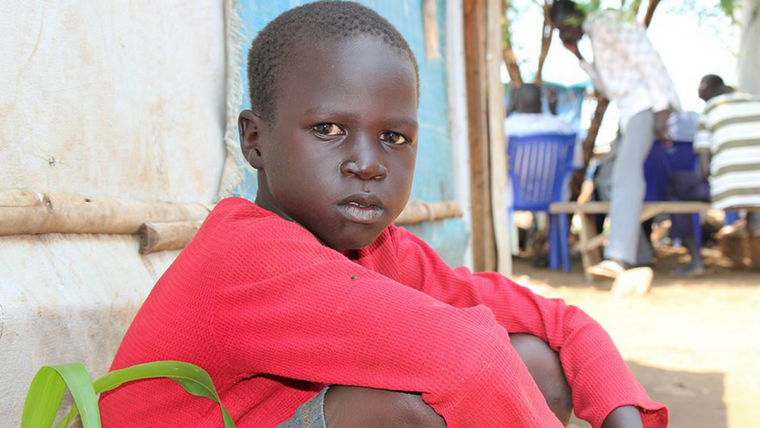
Besides Rewgok, I have four other brothers and sisters. But they are older and they work in a different state. They say it’s easier to make money there. They haven’t come to Juba to see us. Juba is different for me too. I like that I can go to school, but I don’t like living at the camp. There are so many people here.
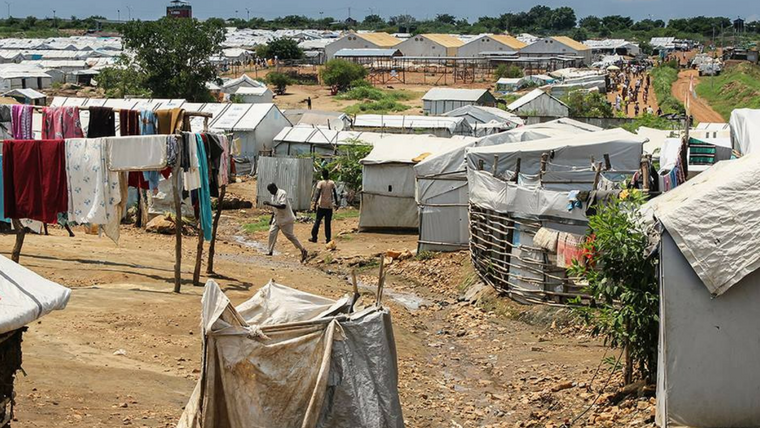
This is the camp we live in. I have learned in school that there are 21,000 registered people here, but most also think there are at least 30,000. I don’t really know what this number means, but it’s a lot of people. Many more came last month, because there was so much fighting in Juba. They say 9,000 more people arrived. I just know there are a lot of people here. We have tents and they are very close to each other; closer than the houses in my village.
My tent has one room and our relatives live next door. They don’t like to be photographed, but they said it’s fine that we get our photos taken. There are public toilets in the camp that everyone uses. They don’t smell good and they are dirty. My relatives say it’s not good to go there because many people here have cholera now and that’s dangerous. We have a bucket and can wash ourselves. There is also a small pond, but it is also very dirty. We usually just take water from the pumps.
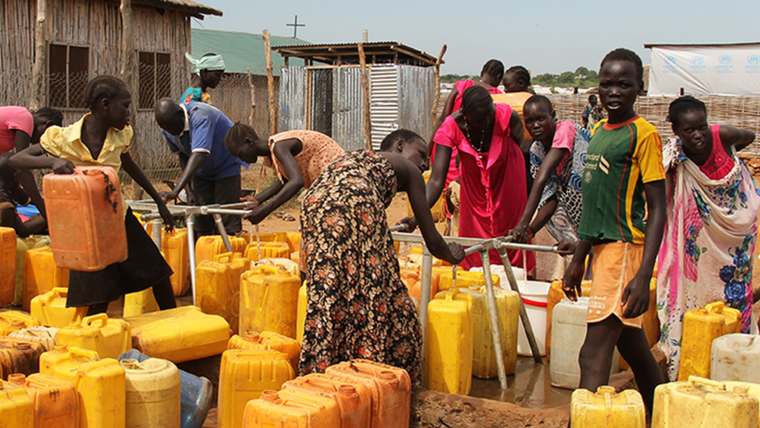
Here is where we fetch our water! Many people queue here every day to fill up the yellow water canisters. They are very heavy to carry. Sometimes I come here too to fetch water, but usually it’s the grown-ups who do it. My mother used to get the water when she was still here. I miss her. When she comes back, I know that she will take care of us and get water for us again. The water is clean and we drink it and use it for cooking.
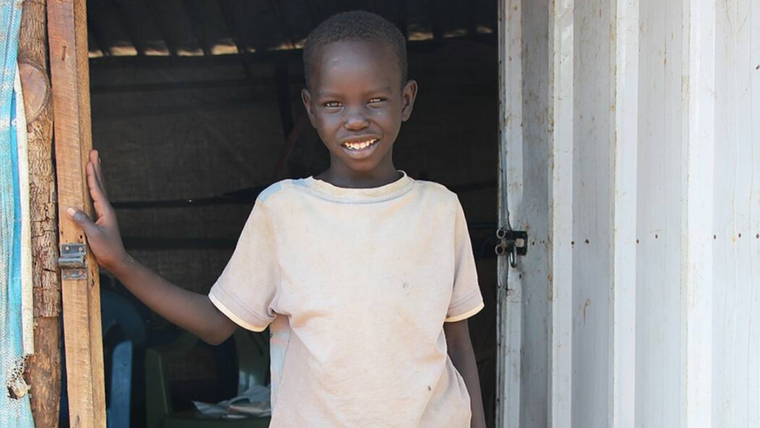 Here is Rewgok, standing in front of our house. It’s not really a house, it’s more a tent, but it’s comfortable. Back home we had a nice hut. It was brown and had a straw roof and at night, I could watch the stars from my door. I could also see bats fly. My village was peaceful until the rebels came. Everything changed then and we had to run away. Since then, my family has never been all together again. I wish I could go back home.
Here is Rewgok, standing in front of our house. It’s not really a house, it’s more a tent, but it’s comfortable. Back home we had a nice hut. It was brown and had a straw roof and at night, I could watch the stars from my door. I could also see bats fly. My village was peaceful until the rebels came. Everything changed then and we had to run away. Since then, my family has never been all together again. I wish I could go back home.

This is our house. We have two beds; one for my parents and one for Rewgok and me. We also cook in here. The beds and the house was given to us when we arrived here. It feels a little empty now, because my parents are not here. We sleep in here alone. Rewgok is scared sometimes. He’s worried that the rebels will come back. I tell him that we are safe here in the camp. People take care of us. The other boy with us is Jerry. He’s our neighbour and he is from a different part of South Sudan.
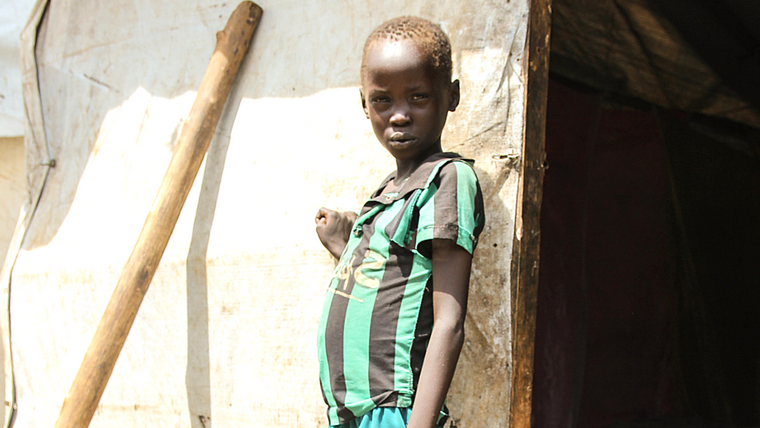
This is Jerry. He says: “I’m living here with my mother and my younger brother. My father died several years ago because he was killed by rebels. We are from Upper Nile and the conflict broke out there, so we had to run away. It was then that my father was killed. We didn’t notice at first, because we all had run in different directions and we hid by the river. But that night, some of our friends told us that he was killed. I cried. We now live here in the camp. I go to school and I have my mum and my brother. I miss my father.”
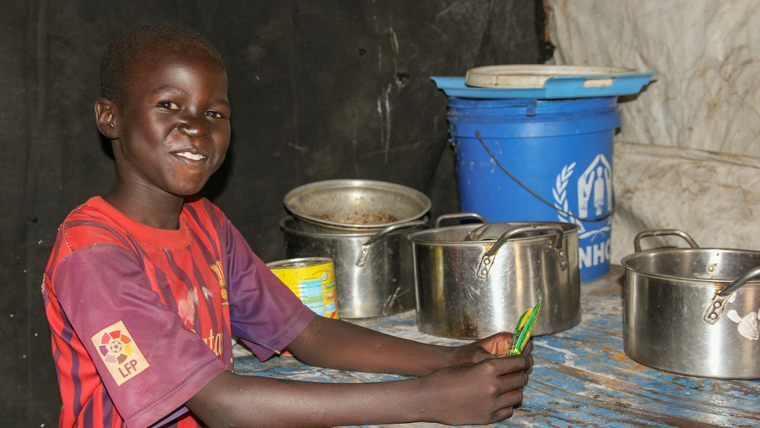 Here is where we cook. We eat rice and beans. Sometimes I’d like to eat goat or chicken, but it’s very expensive. Our relatives take care of us and cook for us. I help with the cooking but Rewgok doesn’t help with the chores. He’s too young. I stir the food to help my aunt. We have a market here in the camp too where we can buy vegetables.
Here is where we cook. We eat rice and beans. Sometimes I’d like to eat goat or chicken, but it’s very expensive. Our relatives take care of us and cook for us. I help with the cooking but Rewgok doesn’t help with the chores. He’s too young. I stir the food to help my aunt. We have a market here in the camp too where we can buy vegetables.
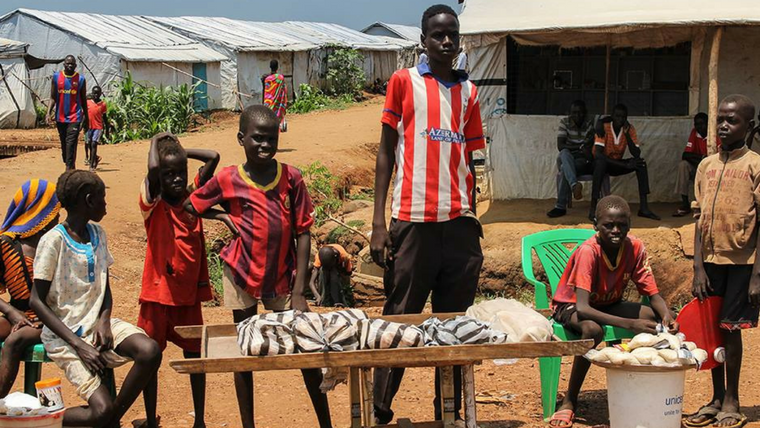
This is our market and it’s right behind our house, on the main street of the camp. They sell flower, rice, beans and vegetables here. They also sell a few electronics and brooms and clothes. It’s the only market we can go to. We don’t buy much, because we get most of our food from World Vision. They provide rice and beans and also give us cash vouchers so we can trade at the market. We don’t have money here anymore, because we don’t have our cattle and our house. I’m happy we receive help. Before we got the food I was often hungry. We only have one meal a day. Now I can have breakfast and dinner at home, and I eat lunch at school.
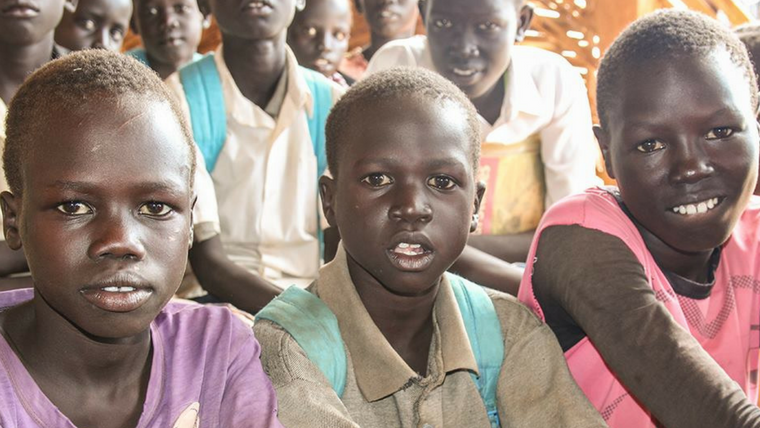
Here is my school. I’m in grade one, because this is my first time going to school. I like science, just like Rewgok. He’s in a different classroom, but he’s also in grade 1. I have many friends at school. Together we sing songs, we learn how to read and write and we play football during our breaks. I used to play football in Unity, and I’m happy I can play here too. My relatives say that I can only go to school because we live in the PoC and they said I should be thankful. Many children in my home village don’t go to school. I like listening to my teacher and I like the other students. My school is close to my home here and I walk every morning. We go to school from 8am until pm. We don’t wear uniforms, although other children in South Sudan wear them. In the camp we don’t have uniforms.
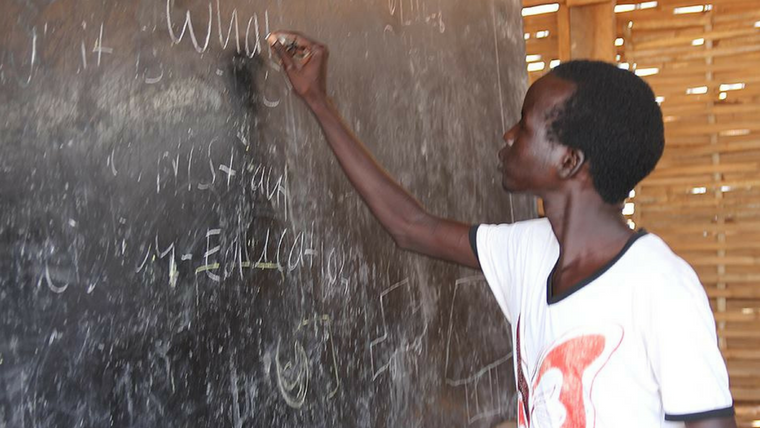
This is my teacher and he teaches all subjects. His name is Mr Akwali. He says: “I’ve been teaching in the PoC for the past year and I also live here. Yes, I’m an IDP and I also had to flee my home in the North when the fighting broke out. I was a teacher in my village once, but they school was closed because none of the teachers could get paid. That’s how I lost my job. I worked in the market for a bit in my town, but there wasn’t enough food to be sold. Then we were attacked. We all had to run away and I first walked several hours, but eventually, I came here to Juba. I moved to the PoC, and I only feel safe here. I don’t want to go outside, because I fear for my life. I’m not sure what will happen with my country, I don’t have a lot of hope. I’m proud to be from South Sudan, but I want to see my country prosper. I’m so happy I was offered a job at the PoC school. It helps me support my family, but I also get to teach these children who are the future of this country. They need to be educated, so they can make this a strong country. I have many smart students and they learn fast. Choul is one of my students. He is mainy quiet, but he is a diligent student. I have about 30 students and they sit on wooden benches. I teach my lessons from the front and write everything on the blackboard. Many students don’t have notebooks, and we try to help them as much as possible. Most don’t even have pens. We distribute supplies when we can and when we get help from aid agencies. It’s difficult being a teacher here, but I’m proud as well that I can work with the students and help them grow up to be educated."
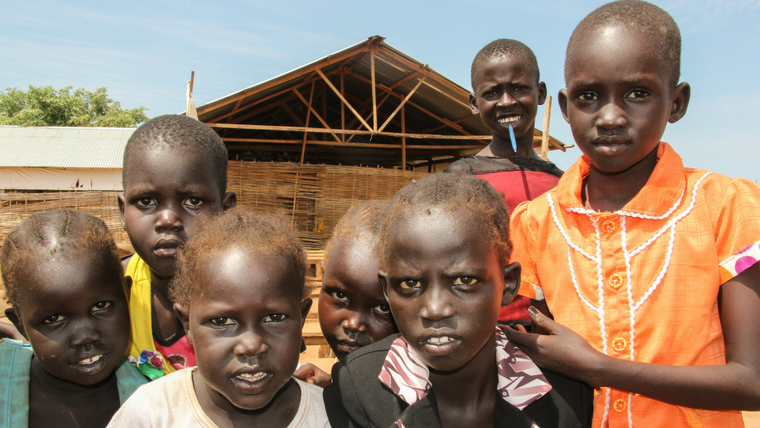
Here are some of my classmates. They are all from different parts of South Sudan. Most had to flee fighting, but some came here because they knew there is a school in the PoC and there isn’t one in many villages. (Fact: 70% of schools in the country are closed, many looted, many occupied by armed forces). We can learn here and I know that back home, this might not be possible. I don’t know how long we will be in the PoC, but as long as I’m here, I know I can go to school.
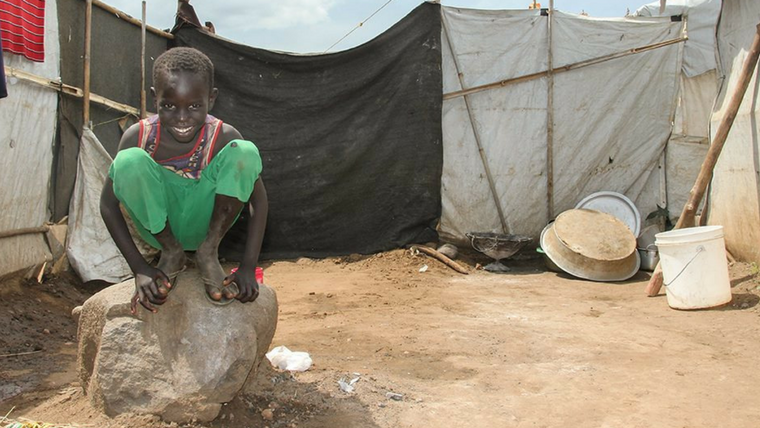
We do the same things here every day here in the PoC and there is no change. Right now, all we are waiting for are my parents. I want them to come back. I don’t want to be here with just Rewgok. That’s him sitting in our courtyard, in from of our tent. We wash the dishes here and we also sit here to do homework. It’s our private space. But every day is the same. We get up, eat rice, then go to school. After school we do our homework and sometimes hang out at the market.
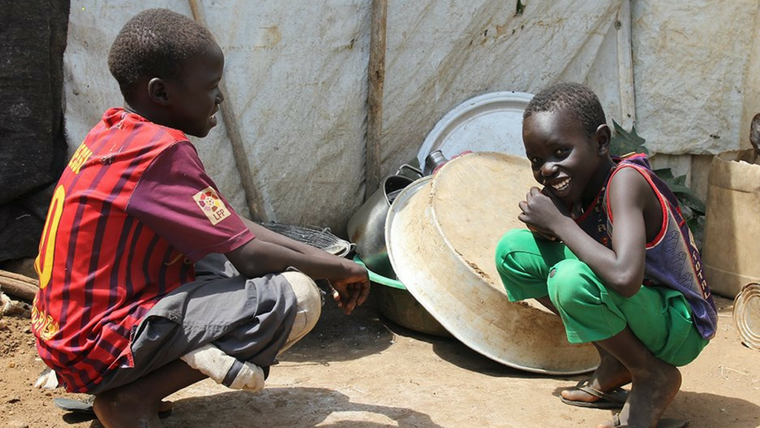
Right now it’s me and Rewgok here in the camp and we are waiting for our parents. My mother’s name is Nyatop and my father’s name is Bafing. My mother worked at the market when she first came here. My father doesn’t work, but he knows many people he likes to talk to. I know they are coming back soon, even my relatives say it. I like to pay games with Rewgok too. We play with marbles or we join games of football.
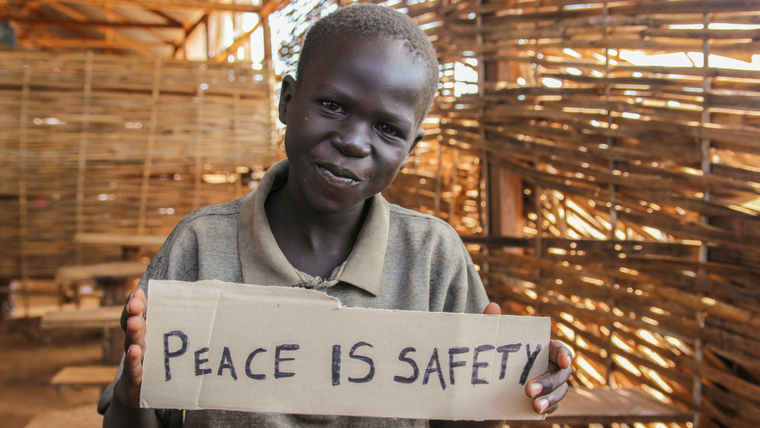
World Vision asked me what peace means to me. I said that peace means safety, because we are safe here in the PoC. I feel safe now, but sometimes I’m scared that new fighting will break out again. I know that my country is still not at peace, but I hope that we will continue to be safe here.
You can help us support children like Choul and Rewgok by giving to our South Sudan Crisis Appeal. You can find out about our work and how we use the funds to help, here»